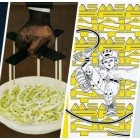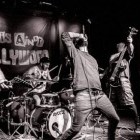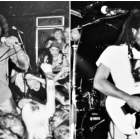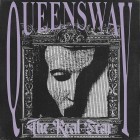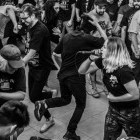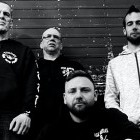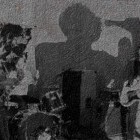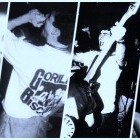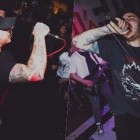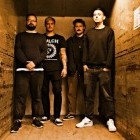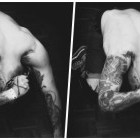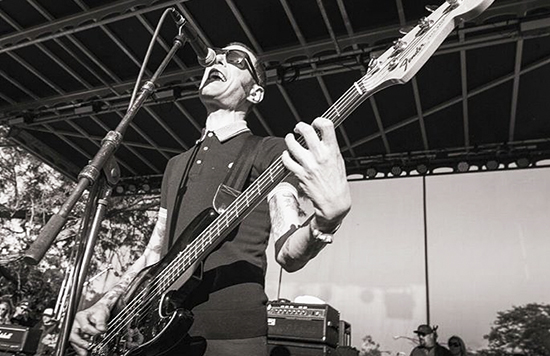
Having been a member of both Gorilla Biscuits and Token Entry in the '80s, Arthur Smilios' place in hardcore history was cemented before he hit his mid-20s. Despite a short stint in the group, Smilios wrote and appeared on Token Entry's debut album, 1987's From Beneath the Streets. A co-founder of Gorilla Biscuits, the bassist appeared on the band's 1989 seminal Start Today album, a record that remains one of Revelation Records' all-time best-selling titles.
After Gorilla Biscuits broke up in the '90s, Smilios, along with two other members of the band, formed CIV. The outfit released two studio albums on a major label, no doubt introducing melodic punk and hardcore to a new wave of listeners who caught CIV's videos on MTV and Music Music. Since reuniting over a decade ago, Gorilla Biscuits perform throughout the world, proving that their positive message and infectious songwriting is as popular today as it was when the band first came out in the late '80s.
These days, outside of his Gorilla Biscuits schedule, Smilios is also a member of a new hardcore group called World Be Free. Also featuring Scott Vogel (Terror, Despair), Andrew Kline (Strife), Joe Garlipp (Despair), and Sammy Siegler (Gorilla Biscuits, CIV, Rival Schools), the band is gearing up for the upcoming release of their debut album, The Anti-Circle. I recently chatted with Smilios about his life in the hardcore scene, his love for Fred Perry, and his passion for activism.
It's always fun to speak with a fellow Queens, N.Y. native. What neighborhood did you grow up in?
I was born in Jackson Heights and I grew up between there (where my mom lived) and Astoria (my dad's neighborhood). I don't really get to visit Jackson Heights as much, but until about four months ago, I was living in Astoria again. Sadly, Astoria is undergoing the same changes that are afflicting New York City as a whole: gentrification and the influx of bourgeois white kids. Now, this city has always been a magnet for people and I have loved that about it. The problem is that whereas in the past we attracted creative people looking for a place to express themselves and belong somewhere, now we have a demographic of essentially indolent hipsters.
We experienced 20 years of disastrous Republican economic models that saw corporation subsidies, eradication of rent control/stabilization, and "business-friendly" policies (read: "destructive for small, independent businesses and good for megacorporations"), and now the people who made this city a great, attractive place can no longer afford to live here. There are still pockets of working-class New York—organic neighborhoods where I hear the accent—but they are disappearing. I fear that at this rate, New York will be as synthetic and intentional as, say, Las Vegas. There is still the ethnic diversity, but homogeneity is creeping in and diluting the fabric of the city.
I'm sorry to sound alarmist, but this is not an observation exclusive to me. It is obvious to anyone who lives here.
No, I appreciate your honesty. When and how did you discover punk music?
My exposure to punk was through my older cousin. He played guitar and I remember thinking how cool he was and how I wanted to be like him. His bedroom had posters of The Clash, Sex Pistols, New York Dolls, and Patti Smith on the walls. Those artists were my first introduction to the music and culture, and it struck a major chord with me. I loved punk's sound, imagery, irreverence, and anger. Now, this was after the Pistols and Dolls were done, so I had The Clash. I tried to go see them in 1981 at their Bond's residency, but my mom (who was very liberal and encouraged my musical and artistic endeavors) said I was too young; furthermore, Times Square in 1981 was not the sterile Disney theme park that it is now. It was a dangerous place—man, how I miss it.
I did finally see The Clash the following year and it was a seminal event. It really did change my life. Joe Strummer and Paul Simonon were like twin pillars of inspiration. I wanted to be a hybrid of them, and I still do. Joe's passion and fury, that leg going non-stop at methamphetamine speed, and Paul just being the coolest cat ever to step on a stage. It was Paul's aesthetic that I adopted, and Joe's politics. To me, The Clash is still the pinnacle of a band.
Did you get into hardcore soon after that?
My introduction to hardcore came a couple of years later, when I moved in with my dad/grandparents in Astoria, in 1984. I had known Ernie Parada and Johnny Steigerwald of Token Entry all my life, from when I would stay with my old man. By '84, they were full-fledged into hardcore, having done Gilligan's Revenge and transitioning into Token Entry. They are two of the nicest people, and they were so accommodating in showing me the music and the scene. Through them I met Anthony Comunale, who was their singer. Anthony was the avuncular professor of punk/hardcore, and he loved to instruct the new kids. He would lend records, clothes, and happily make mix tapes for you, so I got the crash course from him. Walter Schreifels and Civ are also alums of Comunale College.
I was always into music, and before punk/hardcore it was pretty much classic rock, which I still love. The Beatles, Led Zeppelin, The Who—those were my first inspirations to play.
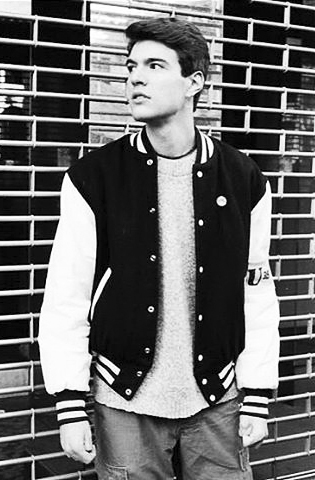
I've learned that many bassists first picked up the instrument out of necessity. Meaning, they wanted to be in a band with their friends, and the only instrument slot available was the bass. Was that the case for you?
I'm happy that you asked this, because this is kind of a sore spot with me. I cannot count how many times I have heard the statement, "I'll play the bass because it's easy." Um, this is not playing the bass, this is hitting the root of the chord. The bass is a nuanced and special instrument, and while mechanically it's similar to guitar, philosophically it is another realm. I always wanted to be a bassist, mainly because of John Paul Jones (whom I eventually met and is the sweetest, most modest human) and John Entwistle. These guys revolutionized the instrument, after Paul McCartney basically invented the idea of rock bass. My mom, who was my champion, didn't really understand why I would want to play a "background" instrument, so she cut a deal with me: if I learned guitar and still wanted to be a bassist after six months, she would buy a bass for me. Now, we did not have money, so this was a huge deal for a 12-year-old kid. To her credit, she kept her end of the bargain. I am so thankful to her for this arrangement, as I also know how to play guitar.
Interestingly, with me, the opposite of your question was true on more than one occasion. I ended up playing guitar in a few bands because they already had a bassist. I would look over with envy, wishing that I were playing the four strings, instead of the superfluous six. Even though it has gained a greater appreciation, the bass will never be as popular as the lead instruments, and I like this. Bassists are a particular breed of weirdo, and only we can truly understand each other. This is why, in New York, we have the "Bass Mafia," started by the genius Craig Setari [Sick of it All], a titan of the instrument. Among our members are Hoya [Madball], Buske [Manipulation], Adam Blake [H2O], Matt Pincus [Judge], et al. We are a subsonic force!
SEE ALSO: 2014 interview with Freddy Cricien (Madball, Hazen Street).
I've heard various stories on how Gorilla Biscuits came to form. Do you wish to set that straight?
Okay, ignore the Wikipedia entry. This is the story: I met Walter while we worked at a supermarket in Astoria, Waldbaum's. He trained me as a wagon boy. We hit it off and became inseparable. Shortly thereafter, we met Civ and it was triplets. I was playing guitar in Token Entry and Walter wanted to do a band. Being as close as we were and wanting to play bass, I was excited about it. One night, while hanging out skateboarding at the Pyramids (an Astoria skate spot; essentially a set of truncated pyramids—hence the name—at the entrance to the Con Edison plant on 31st Street and 20th Avenue), Bad Religion was playing on the boom box. Civ was singing along with "We're Only Gonna Die" and Ernie of Token Entry had the idea for him to do vocals for this as-yet-unnamed project because his voice was/is beautiful. Walter quickly started writing songs and we eventually grew into a real band.
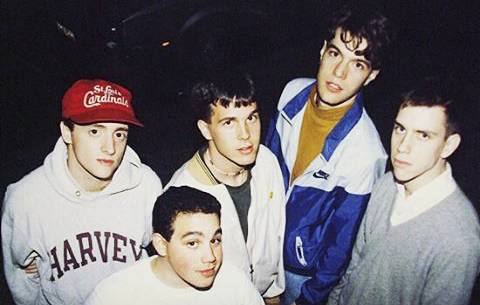
How did you come to work with Token Entry?
Token Entry asked me to play second guitar in late 1985/early 1986 because I was always with them as a friend and they wanted to be a five-piece. I was an official member and played on From Beneath the Streets. I also contributed to the writing of a couple of songs on that record.
You also did some touring playing guitar in Underdog.
In 1987, I parted ways with Token Entry. On Halloween of that year, Underdog was playing a show at Irving Plaza. This was their first show with Richie Birkenhead back as lead vocalist. To this day, Richie is a dear friend and someone whom I admire, but back then, I completely idolized him. I have always been drawn to good lyrics (hence my love for Morrissey and The Clash), and Richie wrote some of the best in hardcore.
After that show, he and Russ Iglay asked me to audition on guitar. I was so excited that I went home and immediately worked out parts to their songs. I believe the audition was at one of the Times Square rehearsal spots. At the end of it, they confirmed that I was in the band. I played with them for about a year. Unfortunately, we never recorded together, but we did a US tour in the summer of 1988. That was the first time I got to play Gilman Street and it was a thrill.
Gorilla Biscuits' Start Today is considered a seminal hardcore album. Why do you think it's resonated with several generations of hardcore fans?
This a tough question, because I am viewing it from the inside. I was there as Walter was writing the album and Civ was making the songs his own. I knew that Walter was onto something when he wrote "High Hopes," but I never expected that Start Today would happen. The messages on that album are not subject to time. They are universal. Being decent and sincere is still important today. Not eating or exploiting non-human animals is just as relevant as ever, if not more so, since science has come a long way from 1989 and the evidence is incontrovertible that doing so is the greatest contributor to climate change and the permanent destruction of our ecosystem. As for it being cruel and gluttonous, well that is self-evident: we know that the animals suffer and that consuming them or using them for our indulgence is completely unnecessary, ergo gluttony. Cats and dogs do indeed have all the luck, sadly.
What did you do in the years between when Gorilla Biscuits broke up in 1991 and CIV's formation in 1994?
I played in a few bands, most notably Angry Head, with Anthony Comunale, Petey Hines [Cro-Mags, Handsome], and Steve Martin [Agnostic Front], but I spent most of that time in college. By 1994, when I was done with school, I really missed doing music as a major part of my life. The timing was perfect, as the germ of the idea for CIV was forming.
SEE ALSO: Absolution: A Retrospective
Something really interesting about CIV was that you guys signed with Lava, a boutique label under the Atlantic Records umbrella. Lava was headed up by Jason Flom, a legendary A&R executive who also signed such artists as Stone Temple Pilots, Twisted Sister, and Tori Amos. What was your experience like working with the staff at the label? If you could go back in time, would you have signed with such a big company?
Hmmm, what's the saying? "Hindsight is 20/20." I can only speak for myself on this one. I stress that I am not in any way a mouthpiece for the other guys. There were some great people who worked at Lava/Atlantic back in the '90s, who really cared about music and the artists, and my experience with them was enjoyable. That being said, coming from punk/hardcore, I never felt at home with the corporate climate. I am not going to malign anyone, but suffice it to say, if I could do it over again, I would have stayed with an independent label. Working with Jordan Cooper and Rev again feels right. We are of the same culture and there is a tacit understanding between all of us.
Why did CIV end up breaking up in 2000? Whatever happened, it looks like the four of you have always remained close.
By the time CIV broke up, which was actually around 1998 - 1999, I had already left the band, so I don't really know the specifics. I imagine that, like most projects, it had run its course. I'm going to take a moment there to express how proud I am of that second record, Thirteen Day Getaway. We put our hearts into that, and—while it has been criticized and unappreciated—I maintain that it was a great record that was about a decade ahead of its time.
As for the four of us remaining friends, we were friends before the band. For better or worse (I believe better), we are a permanent part of each other's lives.
Tell me about World Be Free. The entire project seems like it happened pretty quickly.
The germ of the idea was Scott's. He was running in the Hollywood Hills, listening to—interestingly—Gorilla Biscuits, and he had the idea to do a band in that vein. I know that from there, he contacted Joe, Andrew, and Sam and they started writing songs. It was about a year ago (early 2015) that Sam contacted me to play with them. As soon as I heard the stuff, I was excited. It really doesn't sound like anything else being played right now. The energy is easy and positive and the songs stand on their own. I am really honored that they asked me to be a part of it, and I am extremely proud of The Anti-Circle; in fact, I just framed a vinyl copy and hung it in my apartment alongside a copy of Start Today.
How did you guys track the album? Did you come out to Los Angeles to record your bass parts?
Sam emailed me some demos and I flew out to LA to record. It was a whirlwind. I arrived and we rehearsed that night; the next day, we were in the studio and laid down 17 tracks in two days. We wanted the bass and drums to be as live as possible because it gives the most organic sound. I would say about 85% of the bass tracks were live, with a few punch-ins. The recording sessions were a lot of fun. We did it at Hurley Studios and friends kept coming by, which is always welcome. The guys in World Be Free are the greatest. I tend to get nervous when I record because I want the bass parts to be the best they can be, and those guys were such a calming influence. Sam, especially, since he has experience with me in the studio, was a gem. He talked me down from the abyss and made some great suggestions for bass parts, which I used on the album. Andrew and Joe were rock solid and equanimous, which is saying something, since they had never experienced my neuroses before. Also, [tattoo artist] Dan Smith was great. He came by and promised to do a tattoo of my cat Lysaght's head on my body, a promise which he kept two months later when I was back in LA. This idea certainly brought healthy energy to the sessions.
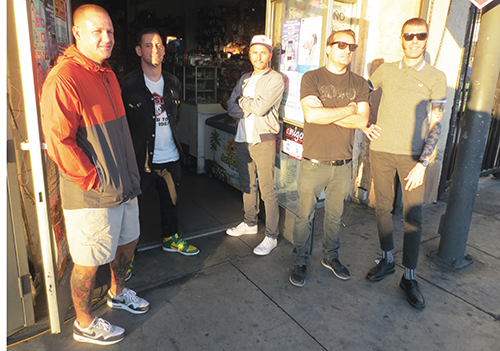
The album is being released by Revelation Records, a label you have a long history with. Do you remember the first time you met Jordan Cooper, the label's owner?
I am so happy that we are working with Revelation. That label is like home and I have a particular love for it. I do remember when I first met Jordan, but there isn't any great story to tell. He is a quiet and unassuming person. I recall thinking that he was very nice and I liked his wry smile that hinted at a mischievous streak in him. He and Ray Cappo [Youth of Today, Shelter] were just getting Rev started and it was a very exciting time in New York hardcore. After being ignored for so long, we had finally organized ourselves, gained some momentum, and were being self-sufficient.
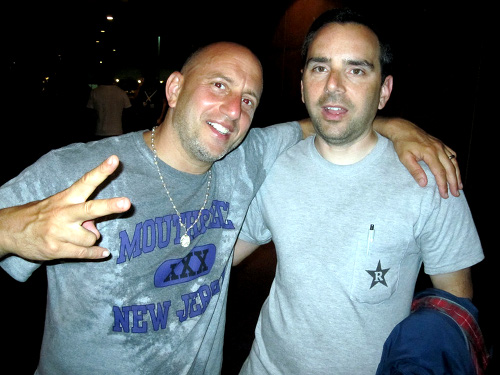
Does World Be Free keep a "let's see how our schedules work out" kind of outlook for the future, or do you already have a game plan mapped out? I know you have some February live dates booked.
Well, aside from the fact that we all have at least one other musical project, we are older now, with the attendant responsibilities. Sam is a dad to the most incredible kid. (She loves cats. How can she be anything but a phenomenon?) Scott, Andrew, and I have cat/dog children, and Joe tour manages. Yes, I maintain that The Who is definitely over the Stones. Let the arguments begin! We are managing to work around everyone's schedule, and we have a number of shows planned for 2016. If all goes well, perhaps we might even be able to do a full tour.
SEE ALSO: 2015 interview with Mike Clark (Suicidal Tendencies, No Mercy, Waking the Dead).
I know you're still living in New York City, but have you ever considered moving out here to Los Angeles?
Funny you should ask that! As recently as last summer, my girlfriend Caitlin and I had decided to move to LA. Aside from the New York winters, we were frustrated that we could ill-afford to live in our native city, so we had a plan to go west. We had even scoped out neighborhoods, narrowing it down to Echo Park, West Hollywood, or North Hollywood. Then Civ stepped in and offered us the apartment above him, in his brownstone. So, because of his munificence, Caitlin and I have been able to stay in New York; not only that, but I am finally living in a neighborhood I have always dreamed of: the legendary Village of Harlem, the center of so much American culture and radical politics.
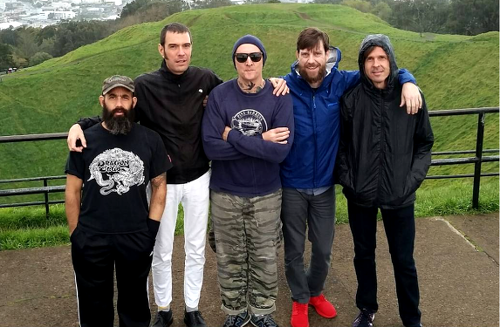
Since I have you here, I wanted to ask you about your love for Fred Perry clothing. I'm also a huge fan and have a pretty large collection of clothing from the brand.
Oh, boy. Okay, this may have progressed to the obsessive stage. I am up to about 70 polos, three parkas, four jackets, about 10 sweaters, two bags, and a number of button-down shirts. I have always loved their clothing. It's mod, thoroughly British, and it looks neat and clean, no matter what. The people there are great as well. They understand that it isn't just clothing, that it's a culture, and they are very responsive to bands and artists who are a part of that culture.
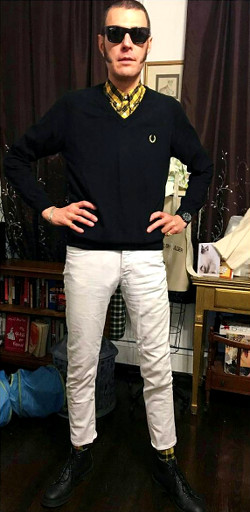
You've spent a lot of your time and energy on activism. Can you tell me a bit about your background in that space, and some of the causes you are most passionate about?
I am a very political person, as anyone who knows me can attest. In the US today, unless you are a member of the rapacious upper class, I don't see how you can be apathetic. Reagan, Bush, Clinton, Bush II, and Obama have implemented destructive economic programs and indulged the folly of war, and who has paid? The working class and poor of the world. Capitalism is an abject failure for the vast majority, yet we still accept it, and in too many cases defend it. It cannot be reformed any more than cancer can be contained. Nobody says, "Let's regulate this cancer. It can coexist with its host." It's just as preposterous to say that capitalism can be regulated. At its core, it is predicated on destruction and exploitation and its time has passed. I would like to see it relegated to the trash heap of historical embarrassments, with a warning that this sick idea should never be tried again because it brings suffering, death, and unmitigated destruction upon the masses, for the benefit of the very few.
Aside from humanity-based politics, animal rights (my first cause) is still so dear to me, and it is tied into the first because all life is sacred. We are selective in our compassion and this is the height of hypocrisy. My girlfriend and I are the adoptive parents of two cats and we love them unconditionally. They are perfect creatures who give us so much and ask so little. Now, pigs, chickens, cows, sheep, fish, etc. are the same. They are sentient. They feel, and like all beings they desire—and have a right—to live peacefully. There is no need to eat, wear, or exploit them for our amusement. This is simply gluttony. If you wouldn't do it to your dog or cat, then why is it okay to do it to another species? It's a simple question, and there can only be two answers: 1. This is obvious and I am going to adhere to a vegan philosophy, or 2. I don't care.
I became political because of two people, mainly: my mom, who had a deep and abiding sense of justice, and Joe Strummer. There are times when I wish I could be apolitical because I know I would be happier, but I can't. It's too late. I witness the horror of this political/economic system every day. I am thankful for my privilege, that I was able to attend a university and do much of what I want, but there are far too many people being crushed and trampled by this vile economic model, and I am a citizen of the world so it is my business. I cannot support a system that denies health care and food to poor children—who, incidentally, have been made poor by the avarice of the wealthy; that murders innocents overseas with bombs; that enriches the vampiric class by eliminating jobs and foreclosing on homes; that incarcerates people (mainly those whose skin isn't white) for no reason other than race and economy; that treats Earth and its inhabitants like possessions and employs wanton destruction.

Outside of World Be Free and Gorilla Biscuits' live dates, do you have any other musical projects we should be on the lookout for?
Well, I have been writing a number of songs for a project I've been meaning to do for a few years. It isn't hardcore. It just is. I have about 20 songs that I've demoed in GarageBand, and one of these days I swear I will get into the studio and record them.
SEE ALSO: Oi! Music: Dig the New Breed
If you had to name one band or album that you feel was underrated in the hardcore scene, who or what would it be?
This is tough, but I can think of a few: anything from Channel 3. They were one of the bands that really got me into this music and not many seem to know of them or appreciate them. Then, there is the second Bad Religion album, Into the Unknown. I know that this is anathema to a lot of people, but aside from the dated '80s synth parts, that is a great album. "Billy Gnosis" is a fabulous song. Andrew and I listened to it the last time I was in Cali, as we drove from Hollywood to San Bernardino, and we freaking rocked out to it.
T.S.O.L.'s Beneath the Shadows was despised at the time of its release, but it has proven to be a great album. I don't know if it's underrated, but that Reagan Youth album is exemplary. Finally, even though it's definitely appreciated, I don't think enough praise can be given to Agnostic Front's Victim in Pain. To me, this is the absolute greatest hardcore album ever. I still get adrenalized when I hear it.
***
World Be Free's debut album, The Anti-Circle, hits stores on Feb. 5 and can be ordered directly from Revelation Records.


